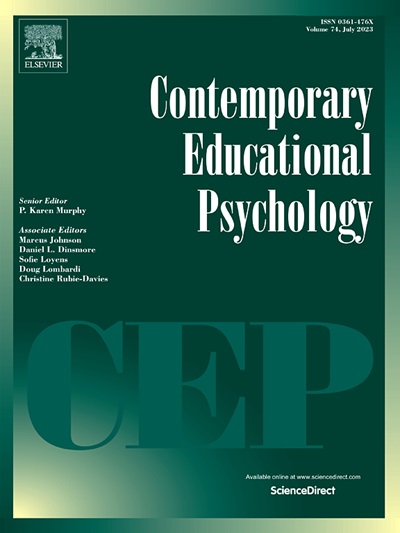CONIC的情境视角:尽责性和情境兴趣在任务水平上的代偿效应的证据
IF 3.8
1区 心理学
Q1 PSYCHOLOGY, EDUCATIONAL
引用次数: 0
摘要
责任心和兴趣对学习都有很大的影响。尽责性×兴趣补偿(CONIC)模型将它们的相互作用概念化为预测学习努力的补偿性。以前的研究主要是将CONIC模型应用于努力的综合衡量,在理解特定学习情境中兴趣激活的微妙机制方面存在空白。为了解决这一差距,我们调查了尽责性和兴趣之间的补偿关系是否不仅适用于课程或科目的水平,而且在处理个人任务时也存在。具体来说,我们研究了学生的责任心和情境兴趣如何相互作用来预测任务努力。我们的样本由1839名德国中学生组成(Mage = 16.4, SD = 1.5, 42.7%为女性)。利用潜在调节结构方程模型,我们观察到责任心和情境兴趣对任务努力的正向主效应,以及它们之间的负交互效应。研究结果支持CONIC模型在任务水平上提出的补偿效应。这项研究有助于更深入地了解尽责性和情境兴趣是如何动态地相互作用来影响学习努力的,并为这些影响如何随着时间的推移而持续影响更广泛的学习成果提供了见解。本文章由计算机程序翻译,如有差异,请以英文原文为准。
A situated perspective on CONIC: Evidence of compensatory effects of conscientiousness and situational interest on the task level
Conscientiousness and interest each have a substantial impact on learning. The conscientiousness × interest compensation (CONIC) model conceptualizes their interplay as compensatory in predicting academic effort. Previous research has primarily applied the CONIC model to aggregated measures of effort, leaving a gap in understanding the nuanced mechanisms underlying the activation of interest in specific learning situations. To address this gap, we investigated whether the compensatory relationship between conscientiousness and interest does not only pertain to the level of a course or subject but does also exists when working on individual tasks. Specifically, we examined how students’ conscientiousness and situational interest interact in predicting task effort. Our sample consisted of 1,839 secondary school students in Germany (Mage = 16.4, SD = 1.5, 42.7 % female). Using latent moderated structural equation modeling, we observed positive main effects of conscientiousness and situational interest on task effort, alongside negative interaction effects between these variables. The findings support the compensatory effects proposed by the CONIC model at the task level. This research contributes to a deeper understanding of how conscientiousness and situational interest interact dynamically to influence academic effort, offering insights into how these effects persist over time to influence broader learning outcomes.
求助全文
通过发布文献求助,成功后即可免费获取论文全文。
去求助
来源期刊

Contemporary Educational Psychology
PSYCHOLOGY, EDUCATIONAL-
CiteScore
16.50
自引率
3.90%
发文量
74
期刊介绍:
Contemporary Educational Psychology is a scholarly journal that publishes empirical research from various parts of the world. The research aims to substantially advance, extend, or re-envision the ongoing discourse in educational psychology research and practice. To be considered for publication, manuscripts must be well-grounded in a comprehensive theoretical and empirical framework. This framework should raise critical and timely questions that educational psychology currently faces. Additionally, the questions asked should be closely related to the chosen methodological approach, and the authors should provide actionable implications for education research and practice. The journal seeks to publish manuscripts that offer cutting-edge theoretical and methodological perspectives on critical and timely education questions.
The journal is abstracted and indexed in various databases, including Contents Pages in Education, Australian Educational Index, Current Contents, EBSCOhost, Education Index, ERA, PsycINFO, Sociology of Education Abstracts, PubMed/Medline, BIOSIS Previews, and others.
 求助内容:
求助内容: 应助结果提醒方式:
应助结果提醒方式:


